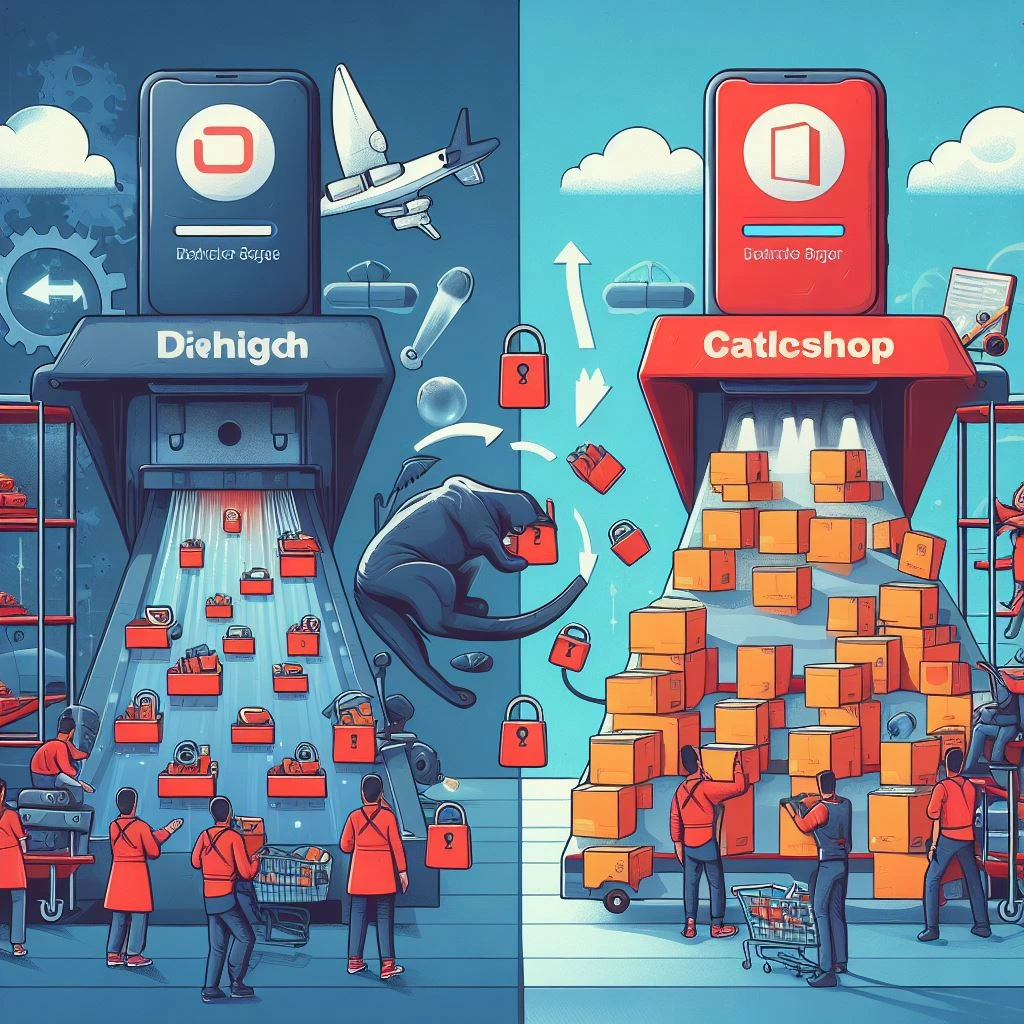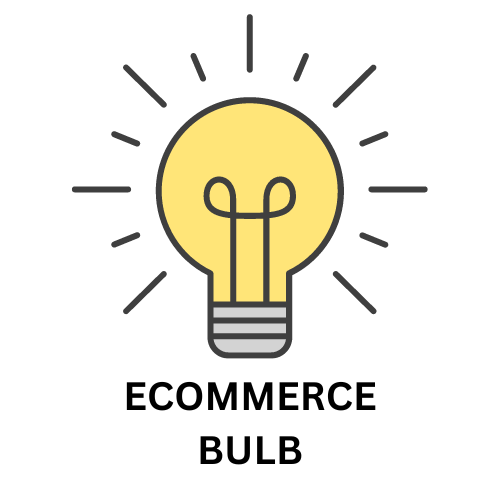In order to decide which ecommerce platform to use, BigCommerce vs Volusion. A detailed comparison between features must be thoroughly done. If you want to decide which eCommerce platform to choose, there are many things to consider.
These are some examples of these factors:
- Cost.
- SEO friendliness.
- Page load speed.
- Canonical website URL.
- Indexing Control.
- Customizable HTML capabilities.
- Sitemap Generator.
- Integration with Google Analytics.
- Product Tagging and Categorization.
- Batch Uploading.
- Mobile Optimization.
- Built-in Blogging and Marketing Features.
- Social Sharing Buttons.
- Content Management Capabilities.
- Discount and promotion code tools.
- Easy to use Checkout.
- Reporting tools and custom reports.
- Integration of email marketing tools.
- Multiple payment options.
- Flexibility to add new eCommerce features.
- Exclusive features.
- Cons and pros.
Here we’ll discuss these factors to help you decide which platform is better for you, Volusion or BigCommerce. And at the end of the discussion, we’ll recap and make a comparison for the scores of all these points to find out which eCommerce platform has the higher score, so that you’ll have a good view about both of them.
Pricing (BigCommerce vs Volsuion):

BigCommerce vs Volusion cost – Volusion vs BigCommerce Pricing
BigCommerce vs Volusion Pricing Overview
Both BigCommerce and Volusion offer tiered pricing plans based on your store’s annual sales volume. Here is a direct comparison of their pricing:
BigCommerce:
| Plan | Monthly Price | Annual Sales Limit | Transaction Fees | Features |
|---|---|---|---|---|
| Standard | $29.95 | $50,000 | 1.5% | Abandoned cart saver, unlimited products, multi-channel selling |
| Plus | $79.95 | $180,000 | 1% | All Standard features, customer groups, product filtering |
| Pro | $299.95 | Unlimited | 0.5% | All Plus features, B2B features, Google Customer Reviews, product reviews |
| Enterprise | Custom pricing | Unlimited | Custom | All Pro features, priority support, dedicated account manager |
Volusion:
| Plan | Monthly Price | Annual Sales Limit | Transaction Fees | Features |
|---|---|---|---|---|
| Personal | $29 | $50,000 | 2% | Abandoned cart saver, unlimited products, multi-channel selling |
| Professional | $79 | $100,000 | 1% | All Personal features, customer groups, product filtering |
| Business | $179 | $500,000 | 0.5% | All Professional features, B2B features, Google Customer Reviews, product reviews |
| Prime | $299 | Unlimited | Custom | All Business features, priority support, dedicated account manager |
Key Differences:
- Starting price: BigCommerce’s Standard plan is slightly cheaper than Volusion’s Personal plan.
- Sales limit: Volusion’s sales limits are generally lower than BigCommerce’s.
- Transaction fees: BigCommerce’s transaction fees are higher than Volusion’s.
SEO Capabilities (BigCommerce vs Volusion):

BigCommerce vs Volusion: SEO Capabilities Summary
BigCommerce:
- More advanced and diverse built-in SEO tools: Automatic URL/title optimization, sitemap generation, meta description editing, CDN, Google Search Console integration.
- More flexible with customizable HTML capabilities: Direct HTML editing for advanced SEO optimization.
- Wider range of SEO app integrations: More options for advanced SEO customization.
- Requires some technical knowledge for advanced SEO tasks: May have a learning curve for beginners.
Volusion:
- Less comprehensive built-in SEO tools: Basic features like meta descriptions, alt tags, and sitemap generation.
- Limited HTML editing capabilities: Makes it difficult to implement advanced SEO strategies.
- Fewer SEO app integrations: Limited choices for advanced SEO customization.
- Easier to use for basic SEO tasks: May not be suitable for complex SEO strategies.
General Recommendation:
- BigCommerce for: Businesses serious about SEO and wanting advanced strategies.
- Volusion for: Beginners with limited technical knowledge and basic SEO needs.
Remember:
- SEO is a long-term strategy.
- Publish high-quality content relevant to your target audience.
- Use keywords strategically.
- Build backlinks to your website.
- Promote your website on social media and other channels.
- Monitor your SEO performance and make adjustments as needed.
PageLoad Speed (BigCommerce vs Volusion):

Sure, here is a summarized comparison of BigCommerce vs Volusion on page load speed:
| Feature | BigCommerce | Volusion |
|---|---|---|
| Page Load Speed | Generally faster | Can be slow, especially for larger stores |
Additional factors to consider:
- Theme/design: A complex theme with large images and scripts can slow down your store’s page load speed.
- Hosting: Choosing a reliable hosting provider with a good reputation for speed and uptime is crucial.
- Image optimization: Optimizing your product images for web can significantly improve page load speed.
- Caching: Implementing caching mechanisms can significantly improve page load speed.
Canonical Website URL (BigCommerce vs Volusion):

Canonical Website URL capabilities, summarized comparison & table (BigCommerce vs Volusion)
Canonical Website URL Capabilities: BigCommerce vs Volusion
Canonical URL is an essential SEO element that helps search engines understand which URL is the “main” version of a page. This prevents duplicate content issues and improves website ranking.
Here’s a comparison of BigCommerce and Volusion’s capabilities for managing canonical URLs:
| Feature | BigCommerce | Volusion |
|---|---|---|
| Canonical URL support | Yes, you can set a canonical URL for each page | No, Volusion does not offer this feature |
| Ease of use | Relatively easy, configurable through the platform interface | Not available |
| Control over canonical URLs | Full control over which URL is considered canonical | No control |
| Impact on SEO | Can significantly improve SEO performance by avoiding duplicate content issues | Potential SEO penalties due to duplicate content |
Summary:
- BigCommerce provides full support for managing canonical URLs, offering a significant SEO advantage.
- Volusion lacks this functionality, potentially hindering your website’s ranking and search engine visibility.
Indexing Control (BigCommerce vs Volusion):

Indexing Control capabilities summarized comparion & table (BigCommerce vs Volusion)
Indexing Control Capabilities: BigCommerce vs Volusion
Indexing control refers to the ability to manage how search engines crawl and index your website’s pages. This allows you to ensure that only the desired pages are shown in search results and prevent search engines from indexing irrelevant or duplicate content.
Here’s a comparison of BigCommerce and Volusion’s indexing control capabilities:
| Feature | BigCommerce | Volusion |
|---|---|---|
| Indexing control options | Yes, allows you to control indexing for individual pages, categories, and product variations | Limited indexing control options, primarily through robots.txt file |
| Ease of use | Relatively easy, configurable through the platform interface | Requires manual editing of robots.txt file, potentially technical for beginners |
| Control over indexing | Granular control over which pages are indexed and how they are presented | Less precise control, limited to broader categories or entire sections |
| Impact on SEO | Improves SEO performance by focusing crawl budget on valuable pages and preventing indexing of unwanted content | Potential SEO issues due to poorly managed indexing, including duplicate content penalties |
Summary:
- BigCommerce offers more comprehensive and user-friendly indexing control than Volusion.
- Volusion’s limited options require more technical expertise and may lead to unintended consequences for SEO.
Customizable HTML Capabilities (BigCommerce vs Volusion):

Customizable HTML Capabilities: BigCommerce vs Volusion
Customizable HTML provides flexibility and control over your online store’s design and functionality beyond what the platform’s built-in features offer. This allows for unique customization and branding.
Here’s a comparison of BigCommerce and Volusion’s customizable HTML capabilities:
| Feature | BigCommerce | Volusion |
|---|---|---|
| Customizable HTML editing | Yes, allows direct editing of HTML code for templates, themes, and individual pages | Limited HTML editing capabilities, mainly through pre-defined templates and modules |
| Freedom of design | Greater flexibility and creativity in design and layout | Less freedom, design heavily influenced by pre-built templates |
| Technical expertise required | Requires knowledge of HTML and CSS for advanced customization | Basic knowledge of HTML and CSS may be sufficient for limited customization |
| Integration with other tools | Easier integration with external design tools and frameworks | Limited integration options with external tools |
Summary:
- BigCommerce provides significantly more freedom for customizing your store’s HTML compared to Volusion.
- Volusion’s limited HTML editing capabilities restrict design flexibility and require users to work within the platform’s constraints.
Sitemap Generators (BigCommerce vs Volusion):

Sitemap Generators: BigCommerce vs Volusion
Both BigCommerce and Volusion automatically generate sitemaps for your online store, but there are some key differences in their capabilities and features:
BigCommerce:
- Automatic sitemap generation: BigCommerce automatically generates a sitemap.xml file that includes all your store’s pages, products, and categories.
- Dynamic sitemap updates: The sitemap is automatically updated whenever you make changes to your store, ensuring search engines are always aware of new content.
- Customizable sitemap settings: You can control which pages and products are included in the sitemap and configure the frequency with which they are updated.
- Integration with Google Search Console: You can submit your sitemap directly to Google Search Console for indexing.
Volusion:
- Automatic sitemap generation: Volusion also automatically generates a sitemap.xml file.
- Limited dynamic updates: The sitemap is only updated periodically, potentially leading to delays in search engine awareness of new content.
- Less control over sitemap content: You have limited control over which pages and products are included in the sitemap.
- No direct integration with Google Search Console: You need to submit your sitemap manually to Google Search Console.
Table summarizing the key differences:
| Feature | BigCommerce | Volusion |
|---|---|---|
| Automatic sitemap generation | Yes | Yes |
| Dynamic sitemap updates | Yes | Limited |
| Customizable sitemap settings | Yes | Limited |
| Integration with Google Search Console | Yes | No |
Recommendation:
- For most businesses, BigCommerce’s automatic sitemap generation with dynamic updates and greater control is the preferred option.
- Volusion’s limited sitemap capabilities may be sufficient for smaller stores with minimal content changes, but could negatively impact SEO for larger stores with frequent updates.
Integration With Google Analytics (BigCommerce vs Volusion):

Integration with Google Analytics: BigCommerce vs Volusion
Both BigCommerce and Volusion offer integration with Google Analytics, allowing you to track website traffic, analyze user behavior, and gain valuable insights into your online store’s performance. However, there are some key differences in their integration capabilities and features:
BigCommerce:
- Seamless integration: BigCommerce integrates seamlessly with Google Analytics, automatically sending data without requiring any manual configuration.
- Extensive data tracking: Tracks a wider range of data points, including product views, purchases, abandoned carts, and more.
- Pre-built dashboards and reports: Provides pre-built dashboards and reports specific to e-commerce, offering instant insights into key performance metrics.
- Customizable reports: Allows you to create custom reports and segments to analyze specific metrics and user behavior.
- Advanced features: Offers advanced features like custom dimensions and metrics, goal tracking, and funnels to analyze specific marketing campaigns and user journeys.
Volusion:
- Integration requires configuration: Volusion’s Google Analytics integration requires manual configuration, involving copying and pasting tracking code.
- Limited data tracking: Tracks a smaller range of data points compared to BigCommerce.
- Basic reporting: Offers basic reporting features with less emphasis on e-commerce-specific metrics.
- Limited customizability: Provides limited options for creating custom reports and segments.
- Fewer advanced features: Offers fewer advanced features compared to BigCommerce, making it difficult to analyze specific marketing campaigns and user journeys in detail.
Table summarizing the key differences:
| Feature | BigCommerce | Volusion |
|---|---|---|
| Integration setup | Seamless | Requires manual configuration |
| Data tracking | Extensive | Limited |
| Pre-built reports | Yes, e-commerce specific | Basic |
| Customizable reports | Yes | Limited |
| Advanced features | Yes | Fewer |
Recommendation:
- For most businesses, BigCommerce’s seamless integration, extensive data tracking, and advanced features make it the preferred option for Google Analytics integration.
- Volusion’s basic integration may be sufficient for small stores with minimal analytics needs, but could limit their ability to gain valuable insights into customer behavior and optimize their online presence.
Product Tagging and Categorization (BigCommerce vs Volusion):

Product Tagging and Categorization, summarized compariosn & table (BigCommerce vs Volusion)
Product Tagging and Categorization: BigCommerce vs Volusion
Organizing your products with effective tagging and categorization is crucial for improving user experience and search engine optimization (SEO). Here’s a comparison of BigCommerce and Volusion in this aspect:
BigCommerce:
- Extensive product tagging: Allows adding multiple tags to each product, facilitating multi-faceted product searches and filtering.
- Hierarchical product categories: Creates a clear hierarchy of categories and subcategories, allowing users to easily browse and find products.
- Automated category assignment: Can automatically assign products to categories based on product attributes, saving time and effort.
- Bulk tagging and categorization: Allows tagging and categorizing multiple products simultaneously, ideal for large inventories.
- SEO-friendly features: Generates SEO-friendly product URLs and meta descriptions based on tags and categories.
Volusion:
- Limited product tagging: Supports fewer tags per product, hindering multi-faceted product searches.
- Flat category structure: Offers a less structured approach to product organization, potentially confusing users.
- Manual tagging and categorization: Requires manually assigning categories and tags to each product, time-consuming for large inventories.
- Limited bulk operations: Offers fewer options for bulk tagging and categorization, requiring more time and effort.
- Basic SEO features: Generates product URLs and meta descriptions, but lacks advanced SEO optimization features based on tags and categories.
Table summarizing key differences:
| Feature | BigCommerce | Volusion |
|---|---|---|
| Product tagging | Extensive | Limited |
| Product categorization | Hierarchical | Flat |
| Automated assignment | Yes | No |
| Bulk operations | Yes | Limited |
| SEO features | Advanced | Basic |
Batch Uploading (BigCommerce vs Volusion):

Batch Uploading Capabilities: BigCommerce vs Volusion
Batch uploading allows you to import multiple products into your online store at once, saving significant time and effort compared to manual creation. Here’s a comparison of BigCommerce and Volusion in terms of batch uploading:
BigCommerce:
- Supports multiple file formats: Accepts CSV, XLS, XLSX, and TXT files for batch product import.
- Advanced mapping features: Allows mapping product attributes and categories to specific fields in your import file, ensuring accurate data transfer.
- Error logging and correction: Provides detailed error logs for any issues encountered during the import process, allowing for easy identification and correction.
- Import templates: Offers pre-defined import templates for commonly used data structures, simplifying the upload process.
- Large file upload capacity: Supports uploading large files with thousands of products, ideal for bulk inventory management.
Volusion:
- Limited file format support: Primarily supports CSV files for product import.
- Basic mapping features: Offers limited options for mapping product attributes and categories, potentially leading to data errors.
- Minimal error handling: Provides limited information about import errors, making it difficult to identify and fix issues.
- No pre-defined templates: Requires manually setting up data fields in the import file, increasing the risk of errors.
- Smaller file upload capacity: Supports uploading files with fewer products compared to BigCommerce, requiring multiple uploads for large inventories.
Table summarizing key differences:
| Feature | BigCommerce | Volusion |
|---|---|---|
| Supported file formats | CSV, XLS, XLSX, TXT | Primarily CSV |
| Mapping features | Advanced | Basic |
| Error handling | Detailed logs and correction | Minimal |
| Import templates | Pre-defined | None |
| File upload capacity | Large | Smaller |
Mobile Optimization (BigCommerce vs Volusion):

Mobile Optimization Capabilities: BigCommerce vs Volusion
In today’s mobile-first world, ensuring your online store is optimized for smartphones and tablets is essential for providing a seamless shopping experience and maximizing sales. Here’s a comparison of BigCommerce and Volusion’s mobile optimization capabilities:
BigCommerce:
- Responsive design: All BigCommerce themes are automatically responsive, adapting to different screen sizes and devices.
- Mobile-specific features: Offers built-in features like mobile checkout, accelerated mobile pages (AMP), and mobile-optimized product pages for a superior mobile experience.
- Fast mobile page load speeds: BigCommerce prioritizes mobile performance, ensuring your store loads quickly on all devices.
- Mobile app integration: Integrates with the BigCommerce mobile app for order management, product editing, and customer support on the go.
- Mobile preview and testing tools: Provides tools to preview your store on different mobile devices and test features for optimal performance.
Volusion:
- Mobile-friendly themes: Volusion offers a selection of mobile-friendly themes, but not all themes are fully responsive.
- Limited mobile-specific features: Lacks some of the built-in mobile features offered by BigCommerce, potentially impacting the mobile shopping experience.
- Slower mobile page load speeds: Volusion’s mobile performance can be slower than BigCommerce, leading to higher bounce rates and lost sales.
- Limited mobile app functionality: Volusion’s mobile app offers basic store management features but lacks the advanced capabilities of the BigCommerce app.
- Fewer mobile testing tools: Provides limited tools for previewing and testing your store on different devices.
Table summarizing key differences:
| Feature | BigCommerce | Volusion |
|---|---|---|
| Responsive design | All themes | Limited |
| Mobile-specific features | Extensive | Limited |
| Mobile page load speed | Fast | Slower |
| Mobile app integration | Advanced | Basic |
| Mobile testing tools | Comprehensive | Limited |
Built-in Blogging & Marketing Features (BigCommerce vs Volusion):

Built-in Blogging & Marketing Features, summarized comparison & table (BigCommerce vs Volusion)
Built-in Blogging & Marketing Features: BigCommerce vs Volusion
In the competitive e-commerce world, content marketing and engaging with your audience are crucial for brand awareness, customer loyalty, and driving sales. Here’s a comparison of BigCommerce and Volusion’s built-in blogging and marketing features:
BigCommerce:
- Integrated blog platform: Offers a built-in blog platform with intuitive tools for creating and publishing blog posts, managing comments, and scheduling content.
- SEO optimization tools: Provides built-in SEO tools like meta descriptions, image alt tags, and social media sharing buttons to improve blog post visibility.
- Email marketing integration: Integrates seamlessly with popular email marketing platforms like Mailchimp and Constant Contact for effective email campaigns and audience engagement.
- Social media integrations: Offers pre-built integrations with major social media platforms for easy sharing and promoting your blog content.
- Coupons and promotions: Allows creating and managing coupons, discounts, and other promotions to incentivize purchases and drive sales.
- Abandoned cart recovery: Features an abandoned cart recovery tool to automatically send emails to customers who leave items in their cart, increasing conversion rates.
Volusion:
- Limited blogging capabilities: Offers a basic blog platform with less intuitive features and limited design flexibility.
- Fewer SEO tools: Lacks some of the SEO optimization tools available in BigCommerce, potentially hindering blog post visibility.
- Limited email marketing integration: Requires additional plugins or integrations for email marketing, adding complexity to the process.
- Basic social media integrations: Provides basic sharing tools for social media, but lacks advanced features and integrations.
- Limited promotion options: Offers fewer options for creating and managing coupons, discounts, and other promotions compared to BigCommerce.
- No built-in abandoned cart recovery: Requires additional plugins or integrations to implement abandoned cart recovery functionality.
Table summarizing key differences:
| Feature | BigCommerce | Volusion |
|---|---|---|
| Blog platform | Integrated, intuitive | Basic, limited features |
| SEO optimization tools | Extensive | Limited |
| Email marketing integration | Seamless | Requires plugins/integrations |
| Social media integrations | Pre-built | Basic sharing tools |
| Coupons and promotions | Comprehensive | Limited options |
| Abandoned cart recovery | Built-in | Requires plugins/integrations |
Recommendation:
- For businesses prioritizing content marketing and engaging with their audience, BigCommerce’s integrated blogging platform, SEO optimization tools, email marketing integration, social media integrations, and built-in promotional tools offer significant advantages.
- Volusion’s limited blogging and marketing features may be sufficient for businesses with minimal content marketing needs, but could hinder their ability to effectively reach and engage their audience.
Social Sharing Buttons Availability (BigCommerce vs Volusion):

Social Sharing Buttons Availability: BigCommerce vs Volusion
Social sharing buttons are crucial for driving traffic and engagement on your online store. Here’s a comparison of BigCommerce and Volusion’s social sharing button availability:
BigCommerce:
- Integrated social sharing buttons: Built-in social sharing buttons for major platforms like Facebook, Twitter, Pinterest, and Instagram.
- Customizable placement: Allows you to customize the placement and appearance of social sharing buttons on your product pages and blog posts.
- Track sharing activity: Provides data on how often your content is shared on social media, giving you insights into your social media marketing effectiveness.
- Mobile-friendly buttons: Social sharing buttons are optimized for mobile devices, ensuring users can easily share your content on the go.
Volusion:
- Requires plugins or integrations: Social sharing buttons are not built-in and require third-party plugins or integrations.
- Limited customization options: Offers limited control over the placement and appearance of social sharing buttons.
- Minimal tracking: Provides minimal data or insights into social sharing activity.
- Limited mobile compatibility: Some social sharing plugins may not be optimized for mobile devices, impacting user experience.
Table summarizing key differences:
| Feature | BigCommerce | Volusion |
|---|---|---|
| Social sharing buttons | Integrated | Requires plugins/integrations |
| Customizable placement | Yes | Limited |
| Track sharing activity | Yes | Minimal |
| Mobile-friendly buttons | Yes | Limited |
Content Management Capabilities (BigCommerce vs Volusion):

Content Management Capabilities, Summarized comparison & table (BigCommerce vs Volusion)
Effectively managing your website’s content is essential for providing a positive user experience, optimizing SEO, and achieving your online business goals. Here’s a comparison of BigCommerce and Volusion’s content management capabilities:
BigCommerce:
- Drag-and-drop content editor: Provides an intuitive drag-and-drop interface for creating and editing pages, making it easy for users with limited technical experience.
- Pre-built content blocks: Offers a library of pre-built content blocks like product lists, image galleries, and testimonials to save time and effort when creating pages.
- Customizable page templates: Allows you to create custom page templates for different types of content, ensuring consistency and a cohesive brand experience.
- Version control: Tracks changes made to your content and allows you to revert to previous versions if needed.
- SEO optimization tools: Provides built-in tools like meta descriptions, image alt tags, and canonical URLs to optimize your content for search engines.
Volusion:
- Less intuitive content editor: Requires more technical knowledge and experience to navigate and edit content effectively.
- Limited pre-built content blocks: Offers fewer pre-built content blocks compared to BigCommerce, restricting design flexibility.
- Basic page templates: Provides basic templates with limited customization options, making it difficult to achieve a unique design.
- Minimal version control: Offers limited version control features, making it difficult to undo mistakes or recover lost content.
- Fewer SEO optimization tools: Lacks some of the built-in SEO tools available in BigCommerce, potentially impacting your content’s search engine visibility.
Table summarizing key differences:
| Feature | BigCommerce | Volusion |
|---|---|---|
| Content editor | Drag-and-drop, intuitive | Less intuitive, requires technical knowledge |
| Pre-built content blocks | Extensive | Limited |
| Page templates | Customizable | Basic, limited options |
| Version control | Comprehensive | Minimal |
| SEO optimization tools | Extensive | Limited |
Discounts & Promotion Codes (BigCommerce vs Volusion):

Discounts & Promotion Codes for merchants, summarized comparison & Table (BigCommerce vs Volusion)
Both BigCommerce and Volusion offer tools for merchants to create and manage discounts and promotion codes, but there are some key differences in their capabilities:
BigCommerce:
- Flexible discount options: Create percentage discounts, fixed amount discounts, and buy-one-get-one (BOGO) offers.
- Auto-apply discounts: Set up automatic discounts based on customer behavior, cart value, or specific products.
- Advanced coupon codes: Generate unique coupon codes for specific promotions or customer segments.
- Multiple discount levels: Offer discounts at product, category, and order levels for targeted promotions.
- Schedule discounts and promotions: Set specific start and end dates for promotions to create a sense of urgency.
- Track promotion performance: Gain insights into how your discounts and promotions are performing with detailed reporting tools.
Volusion:
- Basic discount options: Primarily limited to percentage and fixed amount discounts.
- Limited auto-apply options: Fewer options for automatic discounts compared to BigCommerce.
- Simple coupon codes: Generate generic coupon codes with less flexibility and customization.
- Limited discount levels: Primarily apply discounts at the product and order level.
- Minimal scheduling options: Limited options for scheduling and controlling the duration of promotions.
- Basic reporting: Provides basic reports on promotion usage but lacks advanced insights offered by BigCommerce.
Table summarizing key differences:
| Feature | BigCommerce | Volusion |
|---|---|---|
| Discount options | Flexible (percentage, fixed, BOGO) | Limited (percentage, fixed) |
| Auto-apply discounts | Extensive | Limited |
| Coupon codes | Advanced, customizable | Simple, generic |
| Discount levels | Product, category, order | Product, order |
| Scheduling | Flexible | Limited |
| Reporting | Detailed insights | Basic reports |
Easy to Use Checkout (BigCommerce vs Volusion):

A smooth and user-friendly checkout process is crucial for converting visitors into paying customers and maximizing your online store’s revenue. Here’s a comparison of BigCommerce and Volusion’s checkout capabilities:
BigCommerce:
- One-page checkout: Streamlines the checkout process by minimizing the number of pages customers need to navigate, reducing cart abandonment rates.
- Guest checkout: Allows customers to checkout without creating an account, offering convenience and reducing purchase barriers.
- Multiple payment gateways: Integrates with various popular payment gateways like PayPal, Stripe, and Apple Pay for customer convenience and international payments.
- Address autofill: Automatically fills in address information for returning customers, saving time and effort during checkout.
- Shipping estimator: Provides real-time shipping rates based on customer location and chosen shipping method, ensuring transparency and informed decisions.
- Mobile-optimized checkout: Optimizes the checkout process for mobile devices, ensuring a seamless experience for mobile shoppers.
Volusion:
- Multi-page checkout: Traditional checkout process with multiple pages, potentially increasing cart abandonment rates.
- Limited guest checkout options: Guest checkout may require additional steps or information, hindering convenience.
- Fewer payment gateway integrations: Offers fewer integrated payment gateways compared to BigCommerce, limiting customer payment options.
- Basic address autofill: Provides limited address autofill functionality compared to BigCommerce.
- Simple shipping estimator: Offers basic shipping estimates with limited information compared to BigCommerce.
- Mobile checkout: Checkout process may not be fully optimized for mobile devices, potentially impacting user experience.
Table summarizing key differences:
| Feature | BigCommerce | Volusion |
|---|---|---|
| Checkout layout | One-page | Multi-page |
| Guest checkout | Easy and convenient | Limited options, may require additional steps |
| Payment gateways | Extensive integrations | Fewer integrations |
| Address autofill | Comprehensive | Basic |
| Shipping estimator | Real-time and detailed | Simple with limited information |
| Mobile optimization | Optimized for mobile devices | May not be fully optimized |
Reporting Tools and Custom Reports (BigCommerce vs Volusion):

Reporting Tools and Custom Reports, summarized comparison & Table (BigCommerce vs Volusion)
Having access to comprehensive reporting tools and the ability to create custom reports is essential for understanding your online store’s performance, identifying areas for improvement, and making informed business decisions. Here’s a comparison of BigCommerce and Volusion’s reporting capabilities:
BigCommerce:
- Extensive pre-built reports: Provides a wide range of pre-built reports covering various aspects of your store’s performance, including sales, orders, customers, products, and marketing campaigns.
- Customizable dashboards: Create custom dashboards to visualize key metrics and track your progress towards specific goals.
- Advanced filtering and segmentation: Filter and segment data by various criteria to gain deeper insights into specific customer segments, product categories, or marketing channels.
- Drill-down capabilities: Drill down into specific data points for further analysis and identify underlying trends or patterns.
- Custom report builder: Create custom reports using a drag-and-drop interface to analyze specific data points and answer your unique business questions.
- Integrations with third-party analytics tools: Integrates with popular analytics tools like Google Analytics for even more comprehensive data analysis.
Volusion:
- Limited pre-built reports: Offers fewer pre-built reports compared to BigCommerce, covering mainly basic store metrics.
- Static dashboards: Provides basic dashboards with limited customization options.
- Simple filtering options: Offers basic filtering capabilities but lacks advanced segmentation features.
- Minimal drill-down functionality: Offers limited ability to drill down into specific data points for further analysis.
- No built-in custom report builder: Requires additional plugins or integrations to create custom reports, adding complexity and cost.
- Limited integrations with third-party analytics tools: Offers fewer integrations with advanced analytics tools compared to BigCommerce.
Table summarizing key differences:
| Feature | BigCommerce | Volusion |
|---|---|---|
| Pre-built reports | Extensive | Limited |
| Customizable dashboards | Yes | Static |
| Filtering and segmentation | Advanced | Basic |
| Drill-down capabilities | Extensive | Limited |
| Custom report builder | Yes | Requires plugins/integrations |
| Third-party analytics integrations | Extensive | Limited |
Integration of Email Marketing Tools (BigCommerce vs Volusion):

Integration of Email Marketing Tools, summarized comparison & table (BigCommerce vs Volusion)
Email marketing is a powerful tool for building relationships with customers, driving sales, and promoting your online store. Here’s a comparison of how BigCommerce and Volusion integrate with popular email marketing tools:
BigCommerce:
- Seamless integration with major email marketing platforms: Offers seamless integration with popular platforms like Mailchimp, Constant Contact, and Klaviyo.
- Pre-built email templates: Provides pre-built email templates for various campaigns like abandoned cart recovery, welcome emails, and product promotions.
- Automated email workflows: Automate email workflows based on customer behavior and triggers, such as abandoned carts or purchase confirmations.
- Dynamic email content: Personalize email content with customer data and product recommendations, increasing engagement and conversion rates.
- Detailed reporting: Integrates with email marketing platform reporting tools for comprehensive campaign insights and analysis.
Volusion:
- Limited integration options: Requires plugins or integrations for most major email marketing platforms, adding complexity and potential compatibility issues.
- Fewer pre-built email templates: Offers fewer pre-built email templates compared to BigCommerce, requiring more design effort.
- Basic automation capabilities: Offers limited automation features compared to BigCommerce, restricting the effectiveness of email campaigns.
- Static email content: Less customization and personalization options for email content compared to BigCommerce.
- Limited reporting integration: May require additional steps or integrations to access detailed email campaign reports.
Table summarizing key differences:
| Feature | BigCommerce | Volusion |
|---|---|---|
| Integration options | Seamless with major platforms | Requires plugins/integrations |
| Pre-built templates | Extensive | Limited |
| Automation capabilities | Advanced | Basic |
| Dynamic content | Personalized | Static |
| Reporting integration | Comprehensive | Limited |
Multiple Payment Options (BigCommerce vs Volusion):

Multiple Payment Options, summarized comparison & table (BigCommerce vs Volusion)
Offering multiple payment options is crucial for online businesses to reduce cart abandonment and cater to the diverse preferences of customers. Here’s a comparison of BigCommerce and Volusion’s capabilities in this aspect:
BigCommerce:
- Extensive payment gateway integrations: Integrates with a wide range of popular payment gateways, including PayPal, Stripe, Apple Pay, Amazon Pay, and Google Pay.
- International payment processing: Supports various international currencies and payment methods, enabling global sales.
- Alternative payment options: Offers integrations with alternative payment solutions like Affirm and Klarna for buy now, pay later (BNPL) options.
- Customizable payment settings: Allows customizing payment options and settings for specific products, customer segments, or countries.
- Fraud prevention tools: Provides built-in fraud prevention tools to protect your business from fraudulent transactions.
Volusion:
- Limited payment gateway integrations: Supports fewer popular payment gateways compared to BigCommerce, potentially restricting customer payment options.
- Basic international payment processing: Supports a limited number of international currencies and payment methods, hindering global sales potential.
- Few alternative payment options: Offers limited integrations with alternative payment solutions, restricting customer flexibility.
- Basic payment settings: Provides fewer customization options for payment settings compared to BigCommerce.
- Limited fraud prevention tools: Lacks some of the advanced fraud prevention tools available in BigCommerce.
Table summarizing key differences:
| Feature | BigCommerce | Volusion |
|---|---|---|
| Payment gateway integrations | Extensive | Limited |
| International payment processing | Comprehensive | Basic |
| Alternative payment options | Extensive | Limited |
| Payment settings customization | Advanced | Basic |
| Fraud prevention tools | Comprehensive | Limited |
Flexibility to Add New eCommerce Features (BigCommerce vs Volusion):

Flexibility to Add New eCommerce Features, summarized comparison & table (BigCommerce vs Volusion)
As your online store evolves, you’ll likely need to add new features and functionality to meet your changing business needs. Here’s a comparison of BigCommerce and Volusion’s flexibility in adding new features:
BigCommerce:
- Open API: Provides a robust open API that allows developers to easily create and integrate custom applications and features.
- App marketplace: Offers a large and diverse app marketplace with thousands of pre-built apps for various functionalities like abandoned cart recovery, marketing automation, and loyalty programs.
- Headless commerce: Supports headless commerce implementations, allowing for greater flexibility and customization in building your online store’s front-end experience.
- Developer resources: Provides extensive documentation, tutorials, and developer support to help you build custom features and integrate third-party applications.
Volusion:
- Limited API: Offers a less open API with limited functionality compared to BigCommerce, making custom development more challenging.
- Smaller app marketplace: Provides a smaller app marketplace with fewer options compared to BigCommerce, potentially limiting your ability to find the features you need.
- No built-in headless commerce support: Requires additional plugins or integrations to implement headless commerce, adding complexity and cost.
- Limited developer resources: Offers fewer developer resources and support compared to BigCommerce, making it more difficult to build custom features and integrations.
Table summarizing key differences:
| Feature | BigCommerce | Volusion |
|---|---|---|
| API | Open and robust | Limited |
| App marketplace | Extensive | Smaller |
| Headless commerce support | Yes | No (requires plugins/integrations) |
| Developer resources | Comprehensive | Limited |
Exclusive Features (BigCommerce vs Volusion):

Both BigCommerce and Volusion offer a wide range of features for online businesses, but they also have some unique features that set them apart. Here’s a summary of exclusive features offered by each platform:
BigCommerce:
- B2B features: Offers dedicated features for B2B businesses, including customer groups, volume pricing, and self-service portals.
- Headless commerce: Supports headless commerce implementations, allowing for greater flexibility and customization in building your online store’s front-end experience.
- Open API: Provides a robust open API that allows developers to easily create and integrate custom applications and features.
- Product filtering and search: Offers advanced product filtering and search capabilities to enhance the user experience and product discovery.
- Content staging: Allows staging and testing content changes before publishing them live on your store.
- Built-in product reviews and ratings: Integrates product reviews and ratings functionality directly into the platform.
- Advanced SEO tools: Provides a comprehensive set of SEO tools to optimize your online store for search engines.
Volusion:
- Built-in blog platform: Offers a built-in blog platform with basic features for content creation and management.
- Social media integration: Provides basic social media integration tools for sharing products and promotions.
- Abandoned cart recovery: Offers an abandoned cart recovery tool to automatically send emails to customers who leave items in their cart.
- Mobile app: Provides a mobile app for managing your store, viewing orders, and analyzing sales data.
- Built-in coupons and promotions: Allows creating and managing coupons and promotions directly within the platform.
- Product recommendations: Offers basic product recommendation features to suggest related products to customers.
- Multi-store management: Allows managing multiple stores from a single account.
Table summarizing key differences:
| Feature | BigCommerce | Volusion |
|---|---|---|
| B2B features | Yes | No |
| Headless commerce | Yes | No |
| Open API | Extensive | Limited |
| Product filtering and search | Advanced | Basic |
| Content staging | Yes | No |
| Product reviews and ratings | Built-in | Requires plugins/integrations |
| SEO tools | Comprehensive | Basic |
| Blog platform | Requires plugins/integrations | Built-in |
| Social media integration | Basic | Basic |
| Abandoned cart recovery | Basic | Basic |
| Mobile app | Yes | Yes |
| Coupons and promotions | Built-in | Built-in |
| Product recommendations | Basic | Basic |
| Multi-store management | Yes | No |
Market Share (BigCommerce vs Volusion):

Market Share: BigCommerce vs Volusion
BigCommerce and Volusion are both popular eCommerce platform providers, but they hold different shares of the global market. Here’s a comparison of their estimated market share:
BigCommerce:
- Market share: 0.69%
- Number of customers: 40,986+
- Source: Dataanyze
Volusion:
- Market share: 0.17%
- Number of customers: 9,885+
- Source: Dataanyze
Additional market share metrics:
- BuiltWith: BigCommerce holds a 0.45% share of the top 1 million websites globally, while Volusion holds a 0.03% share.
- CyberPanel: BigCommerce holds a 0.69% share of all websites using eCommerce platforms, while Volusion holds a 0.17% share.
Table summarizing market share:
| Platform | Market Share | Number of Customers | Sources |
|---|---|---|---|
| BigCommerce | 0.69% | 40,986+ | Dataanyze, BuiltWith, CyberPanel |
| Volusion | 0.17% | 9,885+ | Dataanyze, BuiltWith, CyberPanel |
Cons Of (BigCommerce vs Volusion):

Downsides, summarized comparison & table (BigCommerce vs Volusion)
While both BigCommerce and Volusion offer valuable features and functionalities for online businesses, they also have some downsides that you should consider before making a decision:
BigCommerce:
- Higher pricing: BigCommerce’s pricing plans are generally more expensive than Volusion’s, particularly for larger businesses with high sales volumes.
- Steeper learning curve: BigCommerce’s vast array of features can be overwhelming for beginners and require a steeper learning curve compared to Volusion.
- Limited design flexibility: While offering customization options, BigCommerce’s design flexibility may be limited compared to platforms with open-source code.
- Limited built-in features: Some features like blogging and abandoned cart recovery require additional plugins or integrations, adding cost and complexity.
- Limited support for international businesses: BigCommerce’s built-in internationalization features may not be as comprehensive as other platforms, requiring additional configuration for global sales.
Volusion:
- Limited scalability: Volusion’s scalability may not be suitable for businesses experiencing rapid growth or high traffic volumes.
- Fewer advanced features: Volusion lacks some advanced features offered by BigCommerce, such as headless commerce and B2B functionalities.
- Less robust API: Volusion’s API is less open and flexible compared to BigCommerce, making custom development more challenging.
- Limited app marketplace: Volusion’s app marketplace offers fewer app options compared to BigCommerce, restricting access to specific functionalities.
- Potential for technical issues: Volusion has been reported to experience technical issues and downtime more frequently than BigCommerce.
Table summarizing downsides:
| Platform | Downsides |
|---|---|
| BigCommerce | Higher pricing, steeper learning curve, limited design flexibility, limited built-in features, limited international support |
| Volusion | Limited scalability, fewer advanced features, less robust API, limited app marketplace, potential for technical issues |
Hidden Charges / Cost & Fees (BigCommerce vs Volusion):

While both BigCommerce and Volusion offer transparent monthly pricing plans, there are some potential hidden charges and fees you should be aware of before making a decision:
BigCommerce:
- Transaction fees: BigCommerce charges transaction fees for credit card processing on all plans except the Enterprise plan. These fees can range from 2.9% + 30 cents per transaction to 2.2% + 30 cents per transaction depending on your plan and processing volume.
- Bandwidth and storage: Additional bandwidth and storage beyond the included amount in your plan will incur additional fees.
- Payment gateway fees: Certain payment gateways integrated with BigCommerce may charge additional fees beyond the transaction fees.
- App fees: Many apps in the BigCommerce app marketplace have monthly fees or require a percentage of your sales.
- Custom development: If you require custom development or integrations, you will need to hire a developer for additional costs.
Volusion:
- Cancellation fees: Volusion charges a cancellation fee equivalent to one month’s service if you cancel your subscription within 30 days of signing up.
- Migration fees: If you migrate your store from another platform to Volusion, you may be charged a migration fee.
- Email and bandwidth overages: Exceeding your included email and bandwidth limits will incur additional fees.
- Theme fees: Some premium themes in the Volusion theme marketplace require additional purchase beyond the monthly subscription fee.
- SSL certificate: Volusion does not offer a free SSL certificate, and you will need to purchase one separately.
Table summarizing hidden charges:
| Platform | Hidden Charges |
|---|---|
| BigCommerce | Transaction fees, bandwidth & storage fees, payment gateway fees, app fees, custom development costs |
| Volusion | Cancellation fees, migration fees, email & bandwidth overages, theme fees, SSL certificate cost |
What are the Fortes of eCommerce Platforms (BigCommerce vs Volusion)?
Both BigCommerce and Volusion offer a variety of features and functionalities, but they excel in different areas. Here’s a summary of their strengths:
BigCommerce:
- Scalability: BigCommerce’s robust architecture and flexible pricing plans allow it to scale effectively with businesses of all sizes, from small startups to large enterprises.
- Open API: BigCommerce’s open API enables developers to easily create custom applications and integrations, offering unparalleled flexibility and customization.
- Headless commerce: BigCommerce’s headless commerce support allows for complete front-end development freedom, catering to businesses seeking unique and highly customized online store experiences.
- B2B features: BigCommerce offers dedicated features like customer groups, volume pricing, and self-service portals, making it a strong contender for B2B businesses.
- Comprehensive SEO tools: BigCommerce’s built-in SEO tools and advanced features provide extensive optimization capabilities for better search engine visibility and organic traffic generation.
- Large app marketplace: BigCommerce’s extensive app marketplace offers a vast array of pre-built apps for various functionalities, extending its capabilities without complex development.
Volusion:
- Ease of use: Volusion’s user-friendly interface and intuitive features make it a good choice for beginners or businesses with limited technical expertise.
- Built-in features: Volusion offers several built-in features like blogging, abandoned cart recovery, and coupons, reducing reliance on additional plugins or integrations.
- Mobile app: Volusion’s mobile app provides convenient store management and sales monitoring, allowing businesses to stay connected on the go.
- Multi-store management: Volusion enables managing multiple stores from a single account, ideal for businesses expanding their brands or managing different product lines.
- Affordable pricing: Volusion’s lower pricing plans compared to BigCommerce make it a budget-friendly option for small businesses starting out.
- Customer support: Volusion offers dedicated customer support via phone, email, and live chat, providing assistance when needed.
Table summarizing fortes:
| Platform | Fortes |
|---|---|
| BigCommerce | Scalability, open API, headless commerce, B2B features, SEO tools, large app marketplace |
| Volusion | Ease of use, built-in features, mobile app, multi-store management, affordable pricing, customer support |
Conclusion (Comparison Table for BigCommerce vs Volusion):
As we can see from the detailed comparison between these two platforms (Volusion vs BigCommerce) that the overall score for BigCommerce is better than Volusion’s.
BigCommerce excels in these features:
- Scalability and enterprise needs.
- Customization and development.
- B2B focus.
- Marketing and SEO focus.
While Volusion Excels in these fields:
1. Ease of use.
2. Built-in features.
3. Mobile app.
4. Multi-store management.
5. Affordable pricing.
6. Customer support.
Note that the comparison was done with eCommerce and online business in mind.
I hope this could give you the required insight to choose which eCommerce Platform to use for your future projects!
Here is the full comparison, Volusion vs BigCommerce Review in easy to comprehend bullet points:
| eCommerce Platform | Volusion | BigCommerce |
|---|---|---|
| Price | 8.5 | 8.0 |
| SEO Friendliness | 8.0 | 8.5 |
| Page Load Speed | 6.6 | 7.0 |
| Canonical Website URL | 7.8 | 9.0 |
| Indexing Control | 8.0 | 9.0 |
| Customizable HTML capabilities | 8.6 | 9.0 |
| Sitemap Generator | 8.0 | 8.5 |
| Integration With Google Analytics | 8.0 | 8.5 |
| Product Tagging & Categorization | 7.5 | 8.0 |
| Batch Uploading | 6.4 | 7.5 |
| Mobile Optimization | 8.0 | 8.5 |
| Built-in Blogging & Marketing Features | 8.0 | 9.0 |
| Social Sharing Buttons | 7.9 | 9.0 |
| Content Management Capabilities | 7.7 | 8.5 |
| Discount & Promo Code Tools | 8.3 | 9.0 |
| Easy to Use Checkout | 7.0 | 8.0 |
| Reporting Tools & Custom Reports | 8.4 | 9.5 |
| Integration of Email Marketing Tools | 7.5 | 8.0 |
| Multiple Payment Options | 8.8 | 9.5 |
| Flexibility to Add New eCommerce Features | 7.9 | 9.0 |
| Exclusive Features | 8.6 | 9.0 |
| Market Share | 5.2 | 6.0 |
| CONS & PROS | 7.0 | 8.5 |
| Forte | 7.7 | 8.0 |
| Hidden Fees & Charges | 7.0 | 7.0 |
| Overall Assessment (Average) | 7.7 | 8.4 |


Leave a Reply